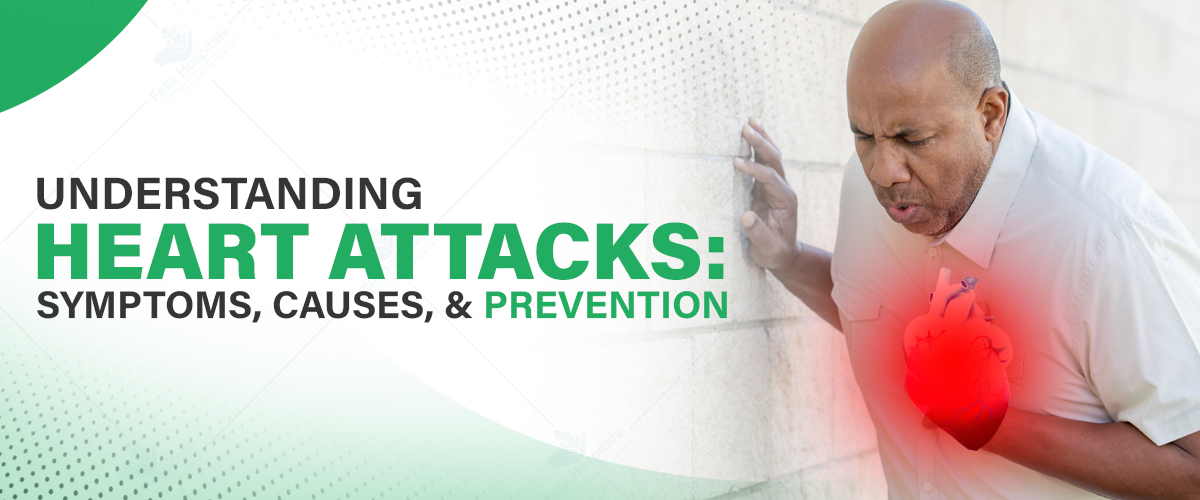
Subscribe to our

Myocardial infarction, the medical term for a heart attack, is a life-altering medical emergency that can occur in a matter of minutes. It occurs when the heart muscle's blood supply is cut off, frequently due to a clot or plaque accumulation, depriving the tissue of oxygen. If nothing is done quickly, this could cause irreversible harm or even death. We at the best hospital in Greater Noida/Noida, a reputable leader in healthcare, are here to equip you with the knowledge you need to identify, avoid, and treat heart attacks. Everything you need to safeguard your heart and lead a healthier lifestyle is covered in this guide, from identifying mild symptoms to making heart-smart decisions.
Concerned about your heart? Take control of your health by making an appointment for your examination with one of our top cardiologists right now by calling +91 9667064100.
A heart attack happens when one or more coronary arteries, which supply blood to the heart, get blocked. This cuts off oxygen to part of the heart muscle, causing it to weaken or die if untreated. Most often, the culprit is a cholesterol-laden plaque that ruptures, triggering a clot. Time is critical—every minute of delay increases damage.
The heart's rhythm and strength are disturbed when blood flow ceases because the afflicted cardiac muscle finds it difficult to pump. If left untreated, this can lower your body's blood flow and increase your risk of organ failure. While some heart attacks occur quickly, others develop over days or weeks, accompanied by warning symptoms like chest pain. Understanding these indicators can make the difference between tragedy and recovery.
The characteristic chest pain is not always experienced by everyone who has a heart attack. A life can be saved by early detection. Common indicators consist of:
Atypical Symptoms: Subtle symptoms like dyspepsia, acute neck pain, or excessive weariness may be experienced by women, elderly folks, or people with diabetes. Rarely, a heart attack might be "silent," meaning it doesn't show any symptoms, but it can still be harmful. If you or a loved one are experiencing these symptoms, don’t wait — visit the best and most trusted hospital near me immediately for prompt and effective treatment.
The majority of heart attacks are caused by coronary artery disease (CAD), a condition in which plaque accumulation (deposits of cholesterol and fat) causes arteries to constrict. An arterial blockage may result from a ruptured plaque that forms a clot. Heart attacks are divided into the following categories based on ECG results:
Heart attacks are more often due to several factors:
After a heart attack, damage may result in:
The good news is that, even after a heart attack, you can reduce your risk:
Immediate and professional medical attention is essential if you or a loved one has had a heart attack or is at risk of having one. Some of the most reputable cardiologists in Noida may be found at Felix Hospital, which provides thorough and individualized treatment programs to prevent heart attacks and promote long-term rehabilitation.
Get to Know Our Skilled Cardiologists:
These well-known cardiac specialists specialize in heart attack patients' early diagnosis, emergency treatment, and rehabilitation. Felix Hospital makes sure you get the best cardiac treatment possible when it counts most by utilizing the newest technology and a caring approach.
Possess risk factors? To create a customized heart health plan, set up a consultation right now.
A heart attack is a wake-up call, but you can overcome it if you know what to do. Your best defenses include identifying symptoms like shortness of breath or chest pain, being aware of the risks, and adopting a healthier lifestyle. From emergency procedures to long-term rehabilitation, Felix Hospitals' Center for Cardiology in Noida/Greater Noida offers compassionate, state-of-the-art care. Feel free to contact us if you have any queries concerning the cost of heart attack treatment in Noida, we are available to offer concise, thorough advice till all of your concerns are addressed.
Give your heart the attention it needs because it drives your life; don't wait for a fright.
Q- Can a heart attack happen without chest pain?
Ans- Yes, especially in women, older adults, and people with diabetes. They may experience symptoms like fatigue, indigestion, or shortness of breath instead of the classic chest pain.
Q- Is it possible to survive a heart attack without knowing you had one?
Ans- Yes, this is called a “silent heart attack.” It often goes unnoticed but can still cause serious damage to the heart and increases the risk of future attacks.
Q- What’s the difference between a heart attack and cardiac arrest?
Ans- A heart attack is a circulation problem caused by blocked arteries. Cardiac arrest is an electrical issue that causes the heart to stop suddenly. A heart attack can sometimes lead to cardiac arrest.
Q- How long does it take to recover from a heart attack?
Ans- Recovery varies depending on severity, but many patients return to normal activities within 6 to 8 weeks with cardiac rehab and lifestyle adjustments.
Q- Can stress alone cause a heart attack?
Ans- Chronic stress can indirectly lead to a heart attack by raising blood pressure, promoting unhealthy habits, and causing hormonal imbalances. Acute stress (like sudden trauma) can also trigger one in rare cases.
Q- Are heart attack symptoms different at night or while sleeping?
Ans- Yes. Night-time heart attacks can feel like indigestion, shortness of breath, or pain in the back or jaw, and might not wake the person up until damage is already occurring.
Q- What tests are done to diagnose a heart attack?
Ans- Common diagnostic tools include ECG (electrocardiogram), blood tests for cardiac enzymes (like troponin), echocardiograms, and coronary angiography to check for blockages.